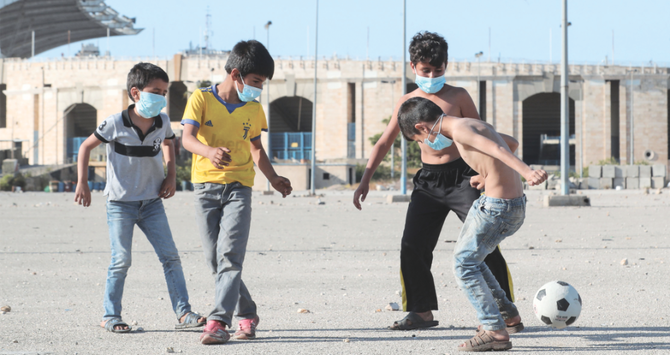
by arabnews.com — NAJIA HOUSSARI — The Lebanese Army, Internal Security Forces (ISF) and municipal police patrolled the streets to catch anyone violating the measures, while ISF armored vehicles were deployed on the streets of Beirut and check points were set up across the country. The exchange rate of the dollar to the Lebanese pound (LBP) slightly decreased on the black market in light of the closure of banks and money exchange shops. It was bought for LBP4,150 and sold for LBP4,250. Pharmacies, bakeries, food stores and gas stations were exempted from closing, while security forces caught and issued tickets to beachgoers. People in Tripoli were outraged by the total lockdown amid the economic crisis they are suffering from. Some even tried to open their shops by force on Wednesday night but, the security forces prevented them from doing so.
During a Cabinet meeting held on Thursday, the minister of health, Hamad Hassan, announced: “The ministry’s medical teams were deployed in various regions across the country as part of a widespread campaign aimed at testing those who came in contact with confirmed cases and those suspected of carrying the virus, in order to update the data related to the country’s epidemiological situation.” Hassan is scheduled to provide the government with a report on Sunday, showcasing the information gathered during the lockdown “so that we can work accordingly.” The third phase of the country’s repatriation process started on Thursday with Middle East Airlines (MEA) aircraft bringing back Lebanese nationals who had been tested for COVID-19 from Istanbul, Riyadh, Paris, Abuja, Abu Dhabi and London. Lebanese diplomatic sources told Arab News: “The repatriation of Lebanese citizens will continue to take place by air. So far, we do not intend to bring them back by sea.”
Lebanon is now facing a new crisis due to the collapse of the national currency, with people no longer able to pay the wages of the country’s hundreds of foreign workers in dollars. Lebanon hosts around 250,000 Asian and African domestic workers. Amid the ongoing discussions between the Lebanese government and the International Monetary Fund (IMF), the Finance Minister Ghazi Wazni noted: “we are satisfied with the initial discussions and expect upcoming discussions to be as constructive.” With these discussions expected to take a long time, opposing voices are increasingly criticizing the performance of Hassan Diab’s government when dealing with the smuggling of goods subsidized by the Lebanese government, such as flour and diesel, through illegal crossings. “In a week, the forces deployed along the northern and eastern Lebanese-Syrian borders have arrested 25 persons and seized 10 tankers and 2 pickup trucks carrying around 215,000 liters of diesel along with 2 tankers and 4 pickup trucks carrying 71 tons of flour,” the Lebanese Army declared on Thursday.
During its session, the cabinet decided to seize all the tankers and trucks smuggling goods across the borders and confiscate their cargo for the benefit of the Lebanese Army. Many responded to the secretary-general of Hezbollah, Hassan Nasrallah, after he called on the Lebanese government to coordinate with the Syrian regime in order to find a solution for illegal crossings. “The issue of illegal crossings is being used to blackmail the Lebanese people just like the issue of the Syrian refugees. They can either accept a complete normalization of the relations with the Syrian regime or the situation remains as it is. Either way, the Syrian regime does not want the refugees back and Hezbollah has security and financial interests in keeping the already-known crossings,” said former minister Richard Kouyoumjian.
Sami Gemayel, head of the Kataeb Party, said: “Hezbollah’s control over the government deprives it of the independence needed to do what needs to be done to save Lebanon, particularly mobilizing international and Arab support, which is essential to overcome this crisis. “International support will not be provided as long as the government in controlled by Hezbollah and the borders with Syria are wide open, because someone said that it is forbidden to address this issue,” Gemayel added. The Lebanese president’s son-in-law, Chamel Roukoz, launched a campaign in light of “the crimes committed against the homeland.” He asked for ways to look into corruption cases and the possibility of following up on them without any political and confessional reservations.” Roukoz criticized those in power, including the president’s other son-in-law and head of the Free Patriotic Movement, Gebran Bassil, and said: “You all knew that the country was on the verge of collapse. It seems like each one of you saw in its collapse a blow to his opponents and a chance to get revenge.”
The National Initiative Movement, which is an initiative that brings together intellectuals, former politicians and public affairs activists, questioned “the government’s ability to restore the international community’s confidence while abiding by the orders of Nasrallah, who controls its negotiations and sets the conditions for obtaining soft loans. “The organized smuggling operations of the dollars for the benefit of the Syrian regime and Hezbollah, come within a plan to seize the state’s assets and properties and undermine its banking sector as a preparation to selling its assets to the forces loyal to those controlling the country’s fate,” the movement stressed.



